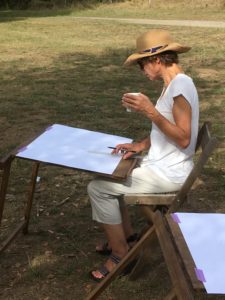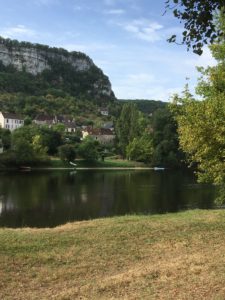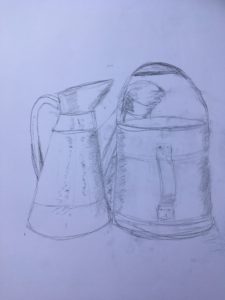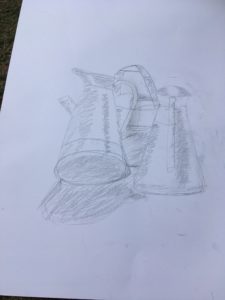07 September 2017
Lifelong Learning
The fun of acquiring new skills.
By Lynda Goetz
 Monday was the day of la rentrée scolaire in France, i.e. the date pupils started the new school year. It also happened to be the day I returned from my own new learning experience in France. I had been in the Lot, not far from the Dordogne River, for a painting and drawing course. Now, as everyone knows, painting and drawing, rather like gardening, are the sort of things that people take up when they finally have time on their hands after retirement. They are skills long neglected during lifetimes dedicated to earning a living, nurturing families and coping with the demands of day-to-day survival. Some have gamely continued to draw or sketch, to build on skills taken as far as GCSE or ‘A’ level, but dropped in favour of careers in PR, administration, management or medicine. However, others never even got that far, abandoning art somewhere around Third Form and relying perhaps on the camera to provide any artistic picture-making. I was one of the latter.
Monday was the day of la rentrée scolaire in France, i.e. the date pupils started the new school year. It also happened to be the day I returned from my own new learning experience in France. I had been in the Lot, not far from the Dordogne River, for a painting and drawing course. Now, as everyone knows, painting and drawing, rather like gardening, are the sort of things that people take up when they finally have time on their hands after retirement. They are skills long neglected during lifetimes dedicated to earning a living, nurturing families and coping with the demands of day-to-day survival. Some have gamely continued to draw or sketch, to build on skills taken as far as GCSE or ‘A’ level, but dropped in favour of careers in PR, administration, management or medicine. However, others never even got that far, abandoning art somewhere around Third Form and relying perhaps on the camera to provide any artistic picture-making. I was one of the latter.
The idea of doing a course was made on impulse. It was being run by the Dutch friend of a friend of mine living in France. She planned to attend and I realised that I was in a position to join her. Decision made! On 25th August I boarded a Ryanair flight from Bristol to Limoges (which I very nearly missed thanks to pre-bank holiday traffic congestion on the M5) full of (literally) screaming kids and families heading out to join retired relatives in France (I wonder if many of them paint?) or those with second homes. From the airport I headed to the impressive Art Nouveau-style station Limoges-Bénédictins (declared a monument historique in 1975) where I caught a very comfortable train to Brive. From there I changed onto a very crowded single-carriage train to my final destination. (France, fortunately for its transport system, did not have a Dr Beeching, although it rather appears that present policies may be heading in that direction).
 I had no real idea of what to expect from the course. Would the participants have much more experience? Would they wonder what on earth I was thinking, attempting to pick up skills I had long since neglected, or would others be in the same position? In the event, it transpired that there were only three of us (a course earlier in the summer had had the maximum of five) and that the third was a Dutch lady who, since the death of her husband, had sculpted for eight years and had been painting for some six or seven. Unsurprisingly she was rather more competent than either of us, but was certainly no budding Great Master. The joy of the six days for all of us was the acquisition of knowledge, the discovery of new techniques and the privilege of focusing on learning, all in beautiful surroundings. Our teacher, by her own admission ‘still learning’ even though she had drawn and painted since she was a child, was encouraging, patient and had the ability with a few simple words to impart ideas, explanations and helpful ways of looking at or thinking of things. The complications of perspective, of ‘vanishing points’, shading and colour mixing appeared, at least for the immediate moment, to be simplified and possible to understand, and feasible to execute.
I had no real idea of what to expect from the course. Would the participants have much more experience? Would they wonder what on earth I was thinking, attempting to pick up skills I had long since neglected, or would others be in the same position? In the event, it transpired that there were only three of us (a course earlier in the summer had had the maximum of five) and that the third was a Dutch lady who, since the death of her husband, had sculpted for eight years and had been painting for some six or seven. Unsurprisingly she was rather more competent than either of us, but was certainly no budding Great Master. The joy of the six days for all of us was the acquisition of knowledge, the discovery of new techniques and the privilege of focusing on learning, all in beautiful surroundings. Our teacher, by her own admission ‘still learning’ even though she had drawn and painted since she was a child, was encouraging, patient and had the ability with a few simple words to impart ideas, explanations and helpful ways of looking at or thinking of things. The complications of perspective, of ‘vanishing points’, shading and colour mixing appeared, at least for the immediate moment, to be simplified and possible to understand, and feasible to execute.
Whilst I was immersing myself in the world of art and of attempting to look at the world more closely and with more acuity, one of my daughters, already a reasonably accomplished artist and a well-qualified professional, was continuing her own education in her late twenties. Having already added kite-surfing to her list of accomplishments earlier in the year, she had decided that she wished to extend or move on from her PADI qualification (acquired at some point during school or university) to learn the art of ‘free-diving’ or diving without equipment. In a family WhatsApp message she proudly announced that she had managed to hold her breath for 4 minutes.
 On my return from France, I met up with a neighbour I had not seen for a while. After excusing ourselves for ‘not being around’, we briefly filled each other in on our activities and the reason for our ‘busyness’ (more of that perhaps in another article). She told me how much she had enjoyed the furniture restoration course she had been doing all year and how she was beginning to get a few people commissioning her to do things for them. Something which had started as a way of occupying herself once her son had left home and she and her husband had finished building their new house has become her next project and is on its way to providing her with a small business.
On my return from France, I met up with a neighbour I had not seen for a while. After excusing ourselves for ‘not being around’, we briefly filled each other in on our activities and the reason for our ‘busyness’ (more of that perhaps in another article). She told me how much she had enjoyed the furniture restoration course she had been doing all year and how she was beginning to get a few people commissioning her to do things for them. Something which had started as a way of occupying herself once her son had left home and she and her husband had finished building their new house has become her next project and is on its way to providing her with a small business.
So, now that the new academic year has started and children are back at school, both in France and in most cases in this country also, should the rest of us simply shrug and feel that those years in education are behind us or should we all be looking for opportunities to improve our own knowledge and skills? Even if you feel there is only one obvious answer to this rhetorical question, how easy is it to do so?
I think the answer to this is that it is not at all difficult, although it is definitely not as cheap or as readily available from the state as it was back at the end of the last century and at the start of this century. The History of the Open University, gives, inter alia, a fascinating insight into the years of building up the Open University (OU) and the various funding crises to which it was subsequently subject. Fees went up dramatically in 2011 (from around £700 for a 60 credit module to around £2,500) putting the cost of a 6-year part-time course up to £15,000. This meant that for those who simply had a thirst for knowledge (rather than a real need for a degree, say to further their career) the cost became something of an off-putting factor. Funding for adult evening classes has also declined over this period and to some extent the choice and variety of subjects has diminished. More emphasis has been placed on learning for career advancement than simply for leisure and pleasure, but then, sadly, this is also true in mainstream Further Education in general.
For those with time on their hands – perhaps no longer the ‘bored housewives’ that some feared would provide the core student body when the OU was set up, but those who are retired or semi-retired – there are a number of options, the foremost of which is the U3A (University of the Third Age). This, as its website proclaims, is ‘an informal, co-operative, volunteer-led organisation’ where people come together to ‘teach and learn from each other’. The UK-wide movement was formed over 30 years ago and consists of over 1,000 locally base groups whose members get together with ‘Learning as its own reward’.
 For those still ‘bogged down’ with jobs and families, the continuation of learning for pleasure may be slightly more difficult, but if you want to learn and are open to new ideas and experiences then there are more ways than ever of doing so. Apart from reading or looking stuff up on Youtube, where almost any subject at all in which you may be interested will have its video made by an expert or a keen and knowledgeable amateur, there are still classes at the Adult Education Centres. They may be fewer and more expensive, but they are still available. In addition there has been a proliferation of private enterprises, enabling those keen to do so to participate in everything from Yoga, Pilates and CrossFit to classes in Indian Cookery, Cup Cake baking or even Longbow-making, not to mention online courses in Writing Storybooks for Children or How to Become a Freelance Journalist. Provided you are really motivated or enthusiastic enough to part with some cash in your quest for knowledge then there is almost no limit to what you can learn or the knowledge you can acquire. Whether these become lifelong passions or passing enthusiasms doesn’t really matter. You do not need to take an exam at the end of most of these courses unless you choose to do so.
For those still ‘bogged down’ with jobs and families, the continuation of learning for pleasure may be slightly more difficult, but if you want to learn and are open to new ideas and experiences then there are more ways than ever of doing so. Apart from reading or looking stuff up on Youtube, where almost any subject at all in which you may be interested will have its video made by an expert or a keen and knowledgeable amateur, there are still classes at the Adult Education Centres. They may be fewer and more expensive, but they are still available. In addition there has been a proliferation of private enterprises, enabling those keen to do so to participate in everything from Yoga, Pilates and CrossFit to classes in Indian Cookery, Cup Cake baking or even Longbow-making, not to mention online courses in Writing Storybooks for Children or How to Become a Freelance Journalist. Provided you are really motivated or enthusiastic enough to part with some cash in your quest for knowledge then there is almost no limit to what you can learn or the knowledge you can acquire. Whether these become lifelong passions or passing enthusiasms doesn’t really matter. You do not need to take an exam at the end of most of these courses unless you choose to do so.
Now, should I go for Freelance Journalism (wonder if there’s an exam in that one?) or try to improve my nascent drawing and painting skills?
If you enjoyed this article please share it using the buttons above.
Please click here if you would like a weekly email on publication of the ShawSheet

